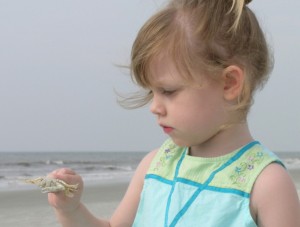Just three weeks ago I paced the house, cleaning and straightening. I was nervous about breaking the horrible news that our neighbor and first-grade teacher had died suddenly. My eight-year-old daughter adored this woman and I knew that she would be hurt.
 Children learn about death from many sources, but they learn about grieving from the people they love most.
Children learn about death from many sources, but they learn about grieving from the people they love most.
Many AP parents want to know how to be an attached parent beyond the baby years. I hope this post helps others to understand how the principles of AP can come together to help you make gentle parenting choices throughout the lives of your children. I did not realize until now just how many AP principles went into my approach.
I learned of the death after dinner, but knew that the end of a long day was the wrong time to tell her. We were still uncertain about the cause of death and hoped that morning would bring more information. Such tragic news delivered at bedtime was sure to bring poor sleep and nightmares. (API Principle 5: Ensure safe sleep; physically and emotionally)
After a good, healthy breakfast (Principle 2: Feed with love and respect) and some play time with her sisters, I found a chance to tell her alone. Random bits of advice and knowledge had swirled around in my head all morning.
Years ago, I heard a child psychologist tell parents that bad news should be delivered to children during the first ten seconds of the conversation. Children often get lost and overly anxious if you spend too much time trying to soften the blow. (Principle 1: Prepare for parenting)
Remembering this, I held her hands (Principle 4: Use nurturing touch) and told her that I had something hard to tell her. She was sitting across from me on my bed. I watched her head drop and her tiny heart break with the horrible words, “Mrs. Apolzan died this weekend.”
With just the slightest movement of my hands, she fell into my arms so we could cry together. (Principle 3: Respond with sensitivity.) Over the next few days, I answered all of her questions as patiently and honestly as I could. We allowed her to cry, to be sad, but also to forget all about it and just play.
She attended a painfully sad memorial service with me at her request and we talked about different customs regarding death, funerals and burial options. She is a very inquisitive child and the extra information seemed to help her to sort out her feelings.
Death is painful only to the living. I did not want to write about it. Looking back now, I realize I simply did not want to live it. I certainly did not want to be the one to inflict the heartache of death upon my child.
But, I’m a mother.
I could never let someone else deliver such a crushing blow. My only real choice was to catch her, to hold her and to love her while she learned this painful lesson of life.
Grace and peace.
We loved you, Mrs. Apolzan, and we will always be grateful for our opportunity to know you.

I am thankful to you for writong this piece and am sorry for your loss. While I follow my inuition when dealing with my son and agree in theory with attachment parent, sometimes I find myself rolling my eyes at how simplified the attachment parents make life seem. My sons father was murdered and discussing his death was not a one time experience or something that lasted a few days. Things are not perfect and I sometimes worry that he will become fearful or angry or closed off. Instead of worrying if I am implementing the right principles to the right issues and perfection, I just choose to let love guide us..on the good days and very bad ones. No one is a perfect parent or makes perfect decisions and I think walking thru all of the mess together its a beautiful gift.
It is never easy to break that news, however it is worth noting that sometimes you need to be careful about who breaks this news if the person who has died is very close / family.
Children can ‘blame the messanger’ without understanding what they are doing. For e.g I have worked with a Grand Mother who had to tell her Grandchildren that their Mother had died. The childrens behaviour was’ fine’ at school but awful with her because they were punishing her. Tough for her all round.
I work with children who have lost someone close to them, something that is very humbling and so worth the heart ache it causes us.
Thank you for sharing this. It is so simple, so beautiful and brought tears to my eyes. I’m sorry for your loss, and for your daughter’s loss also. I admire how you handled Mrs. A’s death. It’s really encouraging to hear how AP principles can be effective beyond the baby years, and beyond breastfeeding and co-sleeping.
My son is still a toddler, but I am already wondering how I will deal with this topic. My only brother died before he was born and I’m still not sure when it will be appropriate to explain it. Death can be very abstract when it’s doesn’t involve a person or animal you interact with regularly. In addition, there is the pain that we, the parents, also experience but don’t want to transfer to our children. Death, like life, is complicated. I trust that my son will be able to handle it, and hope that I can help him do so in a healthy, loving way.